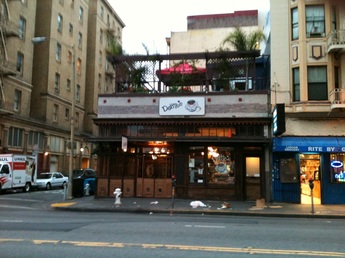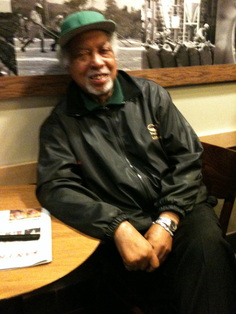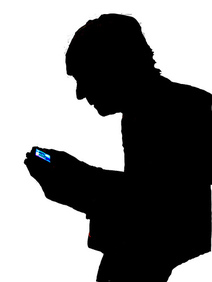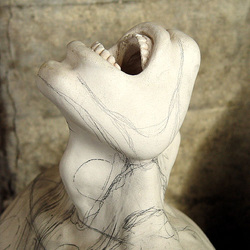 Dottie's True Blue Cafe / Alison R. Dottie’s True Blue Cafe on Sixth Street between Market and Mission is in a scruffy part of the city, where the homeless, alcoholics, druggies, the unlucky ones pass by. Yet here, tourists and locals line up around the block into the alley to have breakfast, willing to disregard that this is not a “cute” street with fun shops.
I was outside Dottie’s on Friday at 8 a.m. for breakfast. Arriving earlier than my friend, Corky, I waited for her on the street when a man passed wearing like a necklace a sign that read, “I Am Loved.” My first thought was 12 Step Program, quickly followed by admiration and then a “What If” question. What if we all believed that we were loved? What if we all knew that, as John Welwood* says, “boundless love always manages somehow to sparkle through” our imperfect selves.
By the time I thought of running after the man to ask about his belief that he was loved, the man was almost to Market. I couldn’t chase him down and keep my place at the front of the line that was forming behind me, the line that would eventually turn the corner down the alley.
What about that very public proclamation: “I Am Loved.” Is it wishful thinking? In which case there’s something silly and sad about the misconception that what you wish for is actually true.
To think wishfully is to interpret facts, reports, events, perceptions, etc., according to what you would like them to be rather than to the actual evidence. The Skeptic’s Dictionary goes so far as to declare that if wishful thinking is done intentionally and without regard for the truth, it is called misinterpretation, falsification, dissembling, disingenuous, or perversion of the truth.
But I think knowing you are loved and saying so is not wishful thinking at all; rather I call it “worshipful thinking.”
John Welwood says in Perfect Love, Imperfect Relationships, “Absolute love is a light that shines through us, from what lies altogether beyond us, the ultimate source of all. We are the channels through which this radiance flows. Yet in flowing through us, it also finds a home within us, taking up residence as our heart-essence.”
Until that morning I had not seen any persons disheveled or sprawled on the sidewalk so clearly show that they know they are loved. For many, pain and suffering has sent them into addiction, or they have been swallowed up by mental illness. Perhaps the recognition that love is their nature has eluded them.
To see the extremes of the human condition reminds me that extreme is different only by degree from the condition of all beings. We all have pain in our pasts; many of us were not loved and have struggled to maintain or become ourselves. And many of us are lucky, lucky not to have been overwhelmed by the ragged aspect of ourselves.
The man whose jewelry says “I Am Loved” really states the obvious. Mostly we think love is outside ourselves and needs to come from other people if we are to experience it. In fact, love and loved is who we are already.
Welwood says we have perfection at the core of our nature. For me it is good to be on Sixth between Mission and Market. Looking at the distress that exists along the street can be a reminder that some kind of breakdown is usually necessary before a breakthrough allows us to experience a new way of living less encumbered by past conditioning.
Before long, Corky joined me, and we were seated at a communal table in a crowded Dottie’s True Blue Café. I told her about the man with the sign saying “I Am Loved” and she told me about words once scratched into the cement on the sidewalk along Castro Street, words she said have been paved over but could be rewritten with colored chalk. “May you feel loved just as you are.”
That is my wish-filled thought for all beings on every street, in every neighborhood: be they lying, sitting, standing or walking. That is my wish for Corky and my wish for me.
*John Welwood has published more than fifty articles on relationship, psychotherapy, consciousness, and personal change, as well as eight books including Journey of the Heart, Love and Awakening, Toward a Psychology of Awakening and Ordinary Magic; and Perfect Love; Imperfect Relationships.
 Neighbor Abe at Starbucks/Alison R. Mother Theresa, Fred Rogers of the PBS show “Mr. Roger’s Neighborhood” and I have one thing in common. We value the people we meet wherever we are.
Show after show, Mr. Rogers put on his cardigan, laced up his indoor shoes and sang about the people in the neighborhood, asking his TV audience, “Won’t you be my neighbor?” He knew the value of those whose lives touch ours.
Mother Theresa said, “Every time you smile at someone, it is an action of love, a gift to that person, a beautiful thing.” And she said, “Go out into the world today and love the people you meet. Let your presence light new light in the hearts of people.”
I think a lot about the people whose paths I cross. Their wellbeing is what feels like religion to me. It is the first principle of seven that guide Unitarian Universalists in lieu of this religion having belief requirements. It is also the ultimate meaning of becoming a bodhisattva if you follow the precepts of the Buddha and hope to use your awakened state for the good of all beings.
In my neighorhood, there are people to greet as I walk from the Safeway parking lot between Webster and Fillmore to the Starbucks at Fillmore and O’Farrell. Not just the living neighbors, but the folks named in the square I cross. African-Americans, Japanese, Filipinos and Jews who have contributed to the welfare of Western Addition and the city. There are the political usuals like Willie L. Brown, Jr., Esq.; but there is also African American, Revels Cayton, a former San Francisco deputy mayor and trade union leader who was the first manager of St. Francis Square, a 300-unit housing development in San Francisco’s Western Addition; Joseph “Joe” Johnson, Labor and Civil Rights Advocate and first African American Deputy Mayor; Isaac Stern, violinist; Yori Wada, first Japanese American appointed to the Board of Regents at UC; and Doris Ward, first African American woman to be elected tax assessor. Lots of important social contributors alphabetical from Fillmore to the parking lot.
The people in my neighborhood include Nicole who patrols the Safeway parking lot, Audrey and Gale who are checkers on the morning shift. When I get to Starbucks, I greet Rob, Jessica, Lee, Mike, Matthew and the other baristas who treat me so well. But it’s not just the baristas whom I count as friends. There’s Danny who lives in the Rosa Parks apartments formerly called The Pink Palace. And Doug who would rather drink Peets coffee but meets me anyway so we can share the morning newspaper. These men are my friends as is Mary who does in-home care and reads the Bible and the fourth-grader Sanai who reads comics with me before she goes to school.
I count Abe, whose last name I don’t know, among these people who matter. He and I are often first arrivals when Starbucks opens at 5:30 a.m.
But we weren’t always friends. I spoke to him about a year ago, suggesting since we saw each other every morning, perhaps we could be friends, but he didn’t see it that way and told me to go away. He picked his own friends and I wasn’t one of them. For many months my appearance in his presence would cause him to make unkind remarks about pushy people, remarks I was meant to overhear. It would have been funny if it didn’t hurt my feelings. The other people I spoke with each morning were also his friends and they couldn’t convince him I was an okay person.
Abe began to end his animosity one morning when I came in excited about a 49ers’ win and could talk about what I had seen that impressed me. He too was feeling upbeat about the victory, and he accepted my enthusiasm.
A day or so later when he came in, I was reading comics with young, Sanai, whose mother was a friend of Abe’s. He said hello to her and asked her what she was doing. She told him she was reading with one of her best friends. After that, Abe decided he and I were friends.
Indeed, every day we speak and many days he gets up from the table that has the best lighting and the plug for charging the computer or phone and tells me to sit there.
We all look after him. Sometimes I will buy him oatmeal and tea because he doesn’t drink coffee. I count Abe among the people in my neighborhood I love and respect.
Loving my neighbors is real whether or not they know it or reciprocate. Abe didn’t have to care for me to be worthy of my regard. It feels better when regard is mutual, but being cared for is not the payoff; it is a bonus.
 Games Player/Robin Hutton I had this to say from the chancel at the Unitarian Universalist church Sunday, August 12 on the topic of what gamers can teach us about church. I want to share with all of you. Comments welcome.
I know almost nothing about Alternate Reality Games. Sometimes a Facebook friend asks me for cows or pigs on Farmville, but I generally ignore their requests. So this reflection is my chance to look at some of the ideas that interest Reverend Jacks. And to borrow gamer’s lingo, I feel on the verge of an epic win.
Now that I know what they are, I will be referring to alternate reality games as ARGs rather than aaarrg which is what pirates say as in Aaaargh, matey. And I hope in response to my quick assimilation of jargon, you will level me up or plusoneme on my use of terminology or UOT, as I am now calling it.
It turns out that both Reverend Jacks and I plan to explore our church experience from the playful perspective of creating our own UU Universe at 1187 Franklin. We each have in mind an alternate religious reality so exciting and engaging, so full of rewards, we willingly pay to be part of it. And if this church is that for you already, think about your personal payoff and how you can make that possible for everyone.
So what can we learn from ARGs? Why do people want to immerse themselves in these unrealities? Those who know say it’s the following: a feeling of urgent optimism due to a reasonable hope of success, the ability to weave a social fabric that makes you like people better, and offers a payoff of epic meaning. According to Jane McGonigal, author of the book Reality is Broken, How Games Change the World and How They Make Us Better, the most popular ARGs guarantee us the four rewards she says we crave most: more satisfying work, better hope of success, stronger social connectivity and more meaning.
It will help to know we UUs already have a lot in common with ARGs. The narrative behind an ARG must be inferred from rules that are not specified at the outset but must be uncovered in the process of the game. Likewise, we UUs pride ourselves on needing no defining creed to arrive at our common values. In an ARG we choose our particular alternate reality, similarly we choose when and how we will be part of the UU Universe.
In my UU Universe, step one will be to design a stunning avatar. I want her to be cuter than I am. I want her hair always the same color with no scheduled salon appointments. I invite you all to imagine your cute self.
The next step is to evaluate our current UU reality. For example: on a scale of one to ten how satisfied are you? Joyful? Empowered? Connected? Inspired? Scoring at the upper end, you know your needs are being met in your church experience. If you are at the low end and you’re still here, you must have something else interesting going on and we could benefit from knowing about it. If all of this seems ridiculous, so much the better if it leads to laughter rather than to cynicism and complaining, of which we already have our share.
So how do I score myself? What brings me back? For me no other religion is as rewarding as Unitarian Universalism because it welcomes wisdom from many sources including the Judeo-Christian. I feel deeply and joyfully connected to many in this community whom I have met through Small Group Ministry, on committees, and doing other work of the church. I show up because these people’s wellbeing matters to me.
How do you score yourself? Some people feel satisfied in their current UU Universe; they have found the right place for their talents and desired level of involvement. Some sing in the choir, gather in small group ministry to explore ideas, some teach in religious education, some feed homeless men in the winter shelter, some trash talk to keep us green, some serve youth in the community in Up on Top, some make fruit salad for the Forum, or eat lunch and listen to speakers at SCW and so on or working for social justice.
But I can’t score my experience on the high end for everything. Despite what I love, I feel less engaged here than in other endeavors. I find myself wanting more meaning, more to remind me of the larger humanity of which we are a part. Some of my malaise may be because I miss hearing the truths that shape the lives of others in our community. Hearing their wisdom during Sunday services moves my heart.
Part of the allure of an ARG is that it makes space for a range of talent while managing to fulfill everyone’s needs. And in our UU Universe, everyone is not going to want the same experience. But each of us can feel we are doing what we are good at to make this community cohesive as we circle outward from those places of individual meaning to create a more generous reality of sharing.
When finally, I design an avatar for my UU Religious Reality, I will give her long embracing arms, a speaking presence, a beaming face with a ready smile, two or more really big ears and year-round hair. What will you look like in your religious reality?
 doublemouth/zen My life goes better when I’m centered, not self-centered. Self-centered behavior is what I do to avoid the ultimate dread of what Emily Dickenson describes as “… a pain – so utter – It swallows substance up….” A self-centered visit to a dentist would have me fretful, in need of reassurance, viewing inattention as a personal affront, and fearful that the pain may not “swallow substance up” but will hurt a lot.
Lucky for me, I feel fully centered the day I show up for oral surgery after my regular dentist said I was in dire need of having a tooth removed or risking (and then she listed risks beyond measure and showed me a blurry but apparently ominous tooth picture.) But she definitely felt strongly, having prescribed immediate and high doses of antibiotics after my early morning distress call. I am this centered self because I have told myself no stories about oral surgery procedures or their aftermath, and with no story to scare me, I am peaceful and equanimous.
I arrive at the oral surgeon’s office for the removal of an offending number three tooth in the upper right quadrant. What ensues could have been a disaster rather than a routine bout of oral surgery were I not my centered self.
Dental emergencies, such as mine, rely on clear communication between the secretary in one dental office and the secretary in the second office; of course each is multitasking as the message is passed. Thus when I finally see the oral surgeon, he thinks that he is scheduled for a consultation during which he will convince me that after I have the tooth removed sometime in the future, I will want to have an implant also sometime in the future and in the meanwhile watch this movie and he’ll be back.
“No,” I intervene. “My dentist said this tooth has to come out now. I’m parked around the corner in a two-hour spot, so it has to be now. He looks again at the x-ray I have included with her referral. “But I have you scheduled for a consultation.” I shake my head. “Take it out now, please.”
He looks at his watch. I can hear the congestion in the waiting room, all those adolescent wisdom teeth, impacted or not, waiting until the end of summer to be removed.
He accedes to my request for immediate surgery. “Gotcha, honey,” he says rumpling my hair.
Needless to say, I don’t like being called “honey” or having my hair tousled, even playfully. But as a centered self, I can pause before automatically mounting a soapbox and chastising him for what feels like ageism and sexism. Instead I can reconnect with the fact that this is the man who will be sticking needles in my gums, wrenching out a tooth, suctioning out poison and staunching the flow of blood. I choose to stay silent and spacious.
Then an assistant escorts me to a more serious looking room. Noisily, she tears into a bag of useful implements, and they crash out onto the metal tray next to my ear. I arch up from where I have been contemplating tree branches, and touching her arm gently, say “Please, your energy is making me nervous.” She apologizes. The doctor explains that she is upset that all the other patients are forced to wait even longer. They both reassure me I should take none of the discord personally. I smile and cower slightly to show I mean no harm. After all, she is in charge of suction and gauze; much of my comfort and well-being will depend on her equanimity.
The Novocain injected, the numbing in full effect, the oral surgeon explains the pressure I will now feel and the cracking sound. Not to worry about the rush of blood. It happens as he predicts. Happily reassured, I sit up too quickly and the assistant just catches that rush of blood. Back down I lie, and shortly the procedure ends.
Numbed and stuffed with gauze, I am led to the business office for a debriefing about the benefits of implants from bone grafts to abutments. On a post-it pad I answer questions, nod and smile as best I can while the assistant checks off pricing, possible insurance coverage and time frame.
Gratitude, gratitude. It is over. No more generalized weariness, low grade fever, pain and swollen gums. I have meditation to thank for my showing up for oral surgery a centered self, comfortable not knowing what was ahead, and thus not hurting myself with anticipated pain.
|




 RSS Feed
RSS Feed